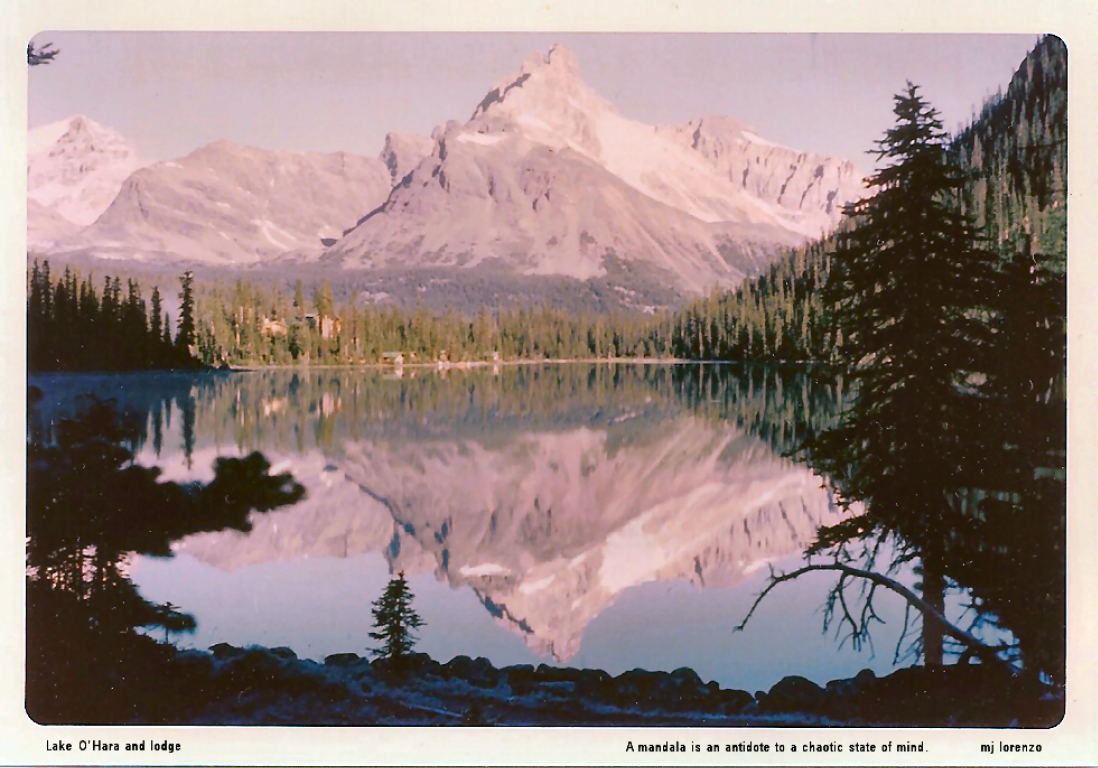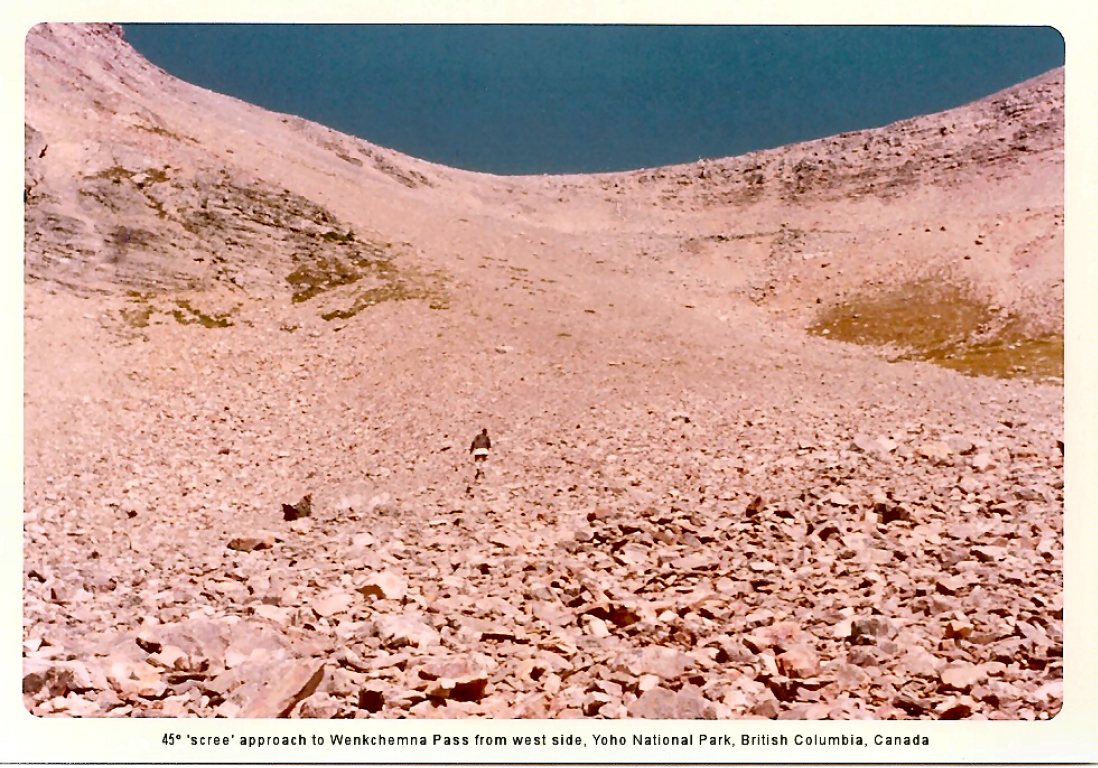

272. Dlune’s trek to
find her dreamer and get him down from the mountain
It is at such an
hour in the late evening two whole days later, after two
very long, clear, brilliantly sunlit days of watching from
Wiwaxy, that Dlune still waits there, hoping to catch sight
of mj emerging from the forest along the distant edge of the
lake a thousand feet below. The shadow of Wiwaxy is about to
overtake the other shore and mj is still nowhere in
sight.
‘I’ll be back by
dark’, he had said: or ‘two or three days’, when they had
talked about it other times; but ‘one day’ when he stood
right here on this spot and promised her.
Dlune begins her
descent from Wiwaxy, down toward camp, alone in the dusky
shadows, stumbling, cutting her feet, falling once, then
slipping and nearly sliding off the ledge to drop straight
down a thousand feet into the freezing-cold glacial lake.
She spends the
shortest, most sunlight-affected night of the year alone and
frightened in the tent near the lake.
Even before dawn
(which at summer solstice is the earliest dawn of the year
in any case, and is especially early when you are so far
north), she rises without benefit of sleep, kicks frost off
the sleeping bag, pulls on khaki pants, hiking boots and a
bomber jacket and collects the black hair on her head into a
straight unit which she ties with a white bow. Her face, a
deeper dark brown than in winter because sunned, and pulled
taut at the mouth corners a bit, pushed and rumpled in the
middle-forehead, naturally tinted rose on the high-placed
cheek bones and glowing even in the tent’s relative
darkness, her face – her face reads: serious. Intent;
worried. A little.
The frown
intensifies as she laces the top holes of her left boot and
pulls the string into a tight bow.
She straightens
the tent, packs some food and water in a knapsack which she
flings across her shoulders, and departs along the meadow
path, bound for the near side of the lake, munching dry
bread.
At the emerald
lake she bypasses
Precious time is
passing. The sky is bright blue already. It is cloudless;
crystal-sharp; pure.
She boards the
lake on its right side then cuts away into the evergreen
forest.
Two hours later
she emerges from trees onto the very high alpine plateau
called Opabin, looks back at the dazzling panorama for a few
seconds; the Yoho peaks in all directions; the green lake
still shaded way down and off to the right; the lodge and
tent in their green meadow far below at center; and
continues up the plateau along streams and around tiny
lakes, trampling with determination but not malice upon
Arnica, Labrador Tea, Valerian, Indian Paintbrush,
Cinguefoil, Dryas and Snow Lily, and brushing past
occasional feathery larch branches, oblivious to the
inviting perfume of evergreen or the lure of dewy grass.

She stops once to drink from a crystalline brook and
lets the water tug at her pony tail.
Her expression still is serious as she picks her way
cautiously over the ancient glacier at the head of the
valley, treading lightly around the crisply frozen edges of
deep, tummy-sinking blue crevasses, climbing constantly
higher toward the pass above, always planting her steps in
any boot-holes bearing mj’s distinctive tread.
Just before the pass Dlune glances left and straight
up at hulking Hungabee and flashes on her grandfather’s
face. She slips and crashes scraping bottom loudly on hard
ice, cries for a painful minute, then goes on.
At the top of
Up to her left is
She follows a stream
up to the foot of her ascent to

She sits down by the brook for a preparatory snack of
bread and cheese and water and lets the noon solstice sun
beat straight into her body through her skin, heating her up
until she has to rid herself of anything hot. She ties her
clothes to the top of the knapsack, throws the pack on her
back and sets out this time in nothing but heavy boots and
white hair-bow, to ascend a mile of ‘scree’ as steep as the
roof of her grandfather’s cabin.
During the first trying hour Dlune scales what looks
like half the distance. Her breasts bounce and droop
earthward each time a rock gives way beneath her and she
slides back. Several times she loses in thirty seconds of
slide all that she just gained from five minutes of delicate
climbing. Reddish scratches mark her legs and bottom
already. Open bleeding cuts ruin the knees. Indian blood is
left to dry on the rocks.
(Only: not quite as Indian as it might have been once back before white man ruined
it. Real squaw blood would have been pumping in a teepee back at camp.)
(No Indian brave ever required or
even allowed the
kind of hand-holding, double-checking and rescue-mission-ing
from a woman
that this white man had to have from Dlune. Not back when
there were real
Indian men anyway.)
During the second hour she covers what she thinks is
half the distance left and then finds a little rest on a
medium-sized boulder. She believes she can see the top of
the pass.
Toward the end of the third hour she thinks she is
almost there because the scree is thinning out, yet the
apparent distance to the ‘top’ has remained unchanged.
During the fourth hour she struggles less with rocks
by finding long stretches of lichen, loose dirt and solid
footing, but has to fight more wind. At the end of this hour
the angle of ascent lessens to 35° then 25° then
10°, until it levels out abruptly and drops again
rapidly eastward into ice-sculpted postcard-touted Moraine
Lake and the Valley of the Ten Peaks.
Dlune is unconcerned with beautiful vistas, however.
She is alone and miserable and wind is making her
perspiration evaporate too quickly.
Mj is nowhere in sight. She coughs twice and searches
for a remnant of him, convinced he must have descended the
other side. In the cold she replaces her clothes and cowers
from the wind, exposed unavoidably on Wenkchemna’s bare
shoulder, the base for climbing both peaks, Wenkchemna and
Hungabee
Both peaks are links in a long chain, two critical
vertebrae in a backbone called The Divide which stretches
north to south, pole to pole, splitting east from west.
Mj has told her that
‘Wenkchemna’ was probably Hungabee’s squaw, the tribal
chief’s wife: for the name has a ‘womanly sound’ to it.
And even a chief needs a woman
helping him at times, for all kinds of crazy things. A
chief more, in fact, according
to doctor mj. Because a chief, especially a medicine man
chief, needs crazier things, the very craziest things any woman might have to do for a man on the planet.
Because: she has to keep him from getting ‘infected by all
that craziness’ he has to deal with. She has to watch like
a hawk for any craziness getting too close to him.

But Dlune’s eyes
are too watery to see anything now.
Finally they dry
and she hawk-eyes one of mj’s notebooks, walks over, picks it
up and reads.
